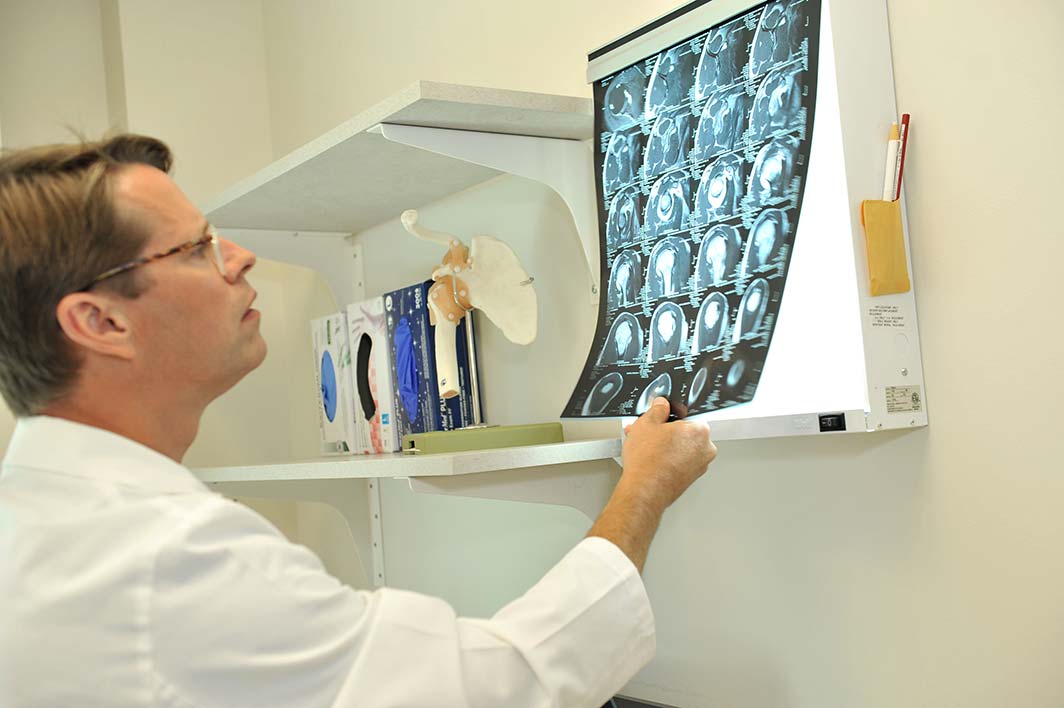Knowing when to see an orthopedic doctor can be difficult. What are the signs, symptoms and conditions that warrant an ortho specialist? How do orthopedic injuries and conditions occur? They can occur in everyday life in the most unexpected ways. Like Rachel’s story:
Rachel hugged her teenage son, and he playfully twisted out of her grasp. She stumbled to regain her balance and heard a pop just before she fell to the ground in pain.
“I knew I needed to go to an orthopedic doctor,” said Rachel. “A regular urgent care just doesn’t have the expertise to determine the extent of my injury. Orthopedic doctors have the expertise, experience and on-site equipment to diagnose and treat my injury, whether a bone fracture or a sprained ankle.”
What is an orthopedic doctor?
Musculoskeletal problems affect millions of Americans every year. Orthopedic doctors specialize in diagnosing and treating diseases, injuries or issues affecting the bones, joints, muscles, ligaments and tendons. Orthopedic physicians treat a wide range of conditions related to the joints, including the neck, back, shoulder, hip, knee, ankle, elbow, wrist and hand.
Mild pain can often be handled at home with compresses, rest, or over-the-counter pain or anti-inflammatory medications. But what if the pain and swelling continue?
Signs you should see an orthopedic specialist
There are times to tough it out and times you should listen to your body and get help. Some orthopedic conditions occur gradually over time as wear and tear impacts the body. Other conditions happen suddenly through an acute injury or accident.
Whether your pain has grown over time or occurred suddenly, consider how much the discomfort is affecting your daily life. Have you made a lot of changes in your routine because of the pain? Depending on your answers, it may be time to see an orthopedic doctor.
Check with an orthopedic specialist if you are experiencing any of the following:
- Pain that lasts longer than 48 hours
- Difficulty performing everyday activities, like getting dressed, eating, bathing, toileting, walking and going up and down stairs
- Limited range of motion
- Pain accompanied by significant swelling, redness or tenderness
- Any visible signs or physical deformity
- Inability to bear weight or proper range of motion
- Injuries accompanied by a popping noise or those that have not improved in 48 hours
- Chronic pain that requires an increasing number of changes to your daily activities
- Joint instability that has the potential to lead to additional injuries or coping strategies that can cause damage to other joints
Common conditions treated by orthopedic specialists
Many conditions and injuries affect the body’s musculoskeletal system. Orthopedic problems include bone fractures, dislocations, rotator cuff tears and ACL tears. Joint pain, chronic pain, arthritis and carpal tunnel syndrome are also examples of when to see an orthopedic doctor.
The experienced orthopedic team at Cary Orthopaedics has decades of experience treating all types of orthopedic conditions. Some of the most common conditions we treat at our offices include:
- Hand and wrist conditions, including arthritis, joint injuries, carpal tunnel syndrome and sprains
- Knee pain, including sprains, strains, torn meniscus, ACL tears, arthritis, kneecap dislocations and tendonitis
- Back pain, including arthritis, degenerative disk disease, herniated disks, SI joint pain, sciatica, scoliosis, spinal stenosis, tumors and whiplash
- Shoulder and elbow injuries, including rotator cuff tears, separated shoulder, frozen shoulder, arthritis, tendonitis, impingement, tennis elbow, strains and bursitis
- Ankle and footc conditions, including sprains, arthritis, bunions, hammer toe, Achilles tendonitis, plantar fasciitis and flat feet
- Sports injuries
- Broken bones or fractures
Whether you injure your muscles, tendons or bones playing sports on the weekend or at work, seek treatment from an orthopedic specialist.
Treatment options
When you hurt your knee, shoulder or back and go to receive treatment, the orthopedic doctor will examine you, ask questions about the cause of your pain and obtain imaging. Once your injury has been diagnosed, the doctor will discuss a treatment plan.
In most cases, our orthopedic surgeons will explore non-surgical treatment options before considering surgery. Many alternative treatment methods can relieve pain without the need for surgical intervention.
Less invasive, non-surgical treatment for musculoskeletal issues may include regenerative medicine, physical therapy or medications. Your orthopedists may also recommend lifestyle changes to improve your condition.
If surgery is required, the orthopedic surgeon will explain all options. Common orthopedic surgeries include joint replacements, arthroscopy, carpal tunnel surgery, trigger finger release and back surgeries.
Following surgery, rehabilitation and a healthy recovery are paramount. Your doctor will likely recommend physical therapy and perhaps occupational therapy. The exercises you perform in physical and occupational therapy will strengthen your joints and improve your flexibility and range of motion.
Benefits of early intervention
While it can be difficult to know when to see an orthopedic doctor, early intervention is the best practice. With orthopedic injuries and chronic conditions, earlier treatment often achieves faster, healthier outcomes.
Orthopedic doctors offer treatment options to help their patients reduce pain, grow stronger and return to activities of daily living. Delayed treatment often leads to more pain before orthopedic treatment. It could also potentially require a more serious course of treatment.
Choosing the right orthopedic specialist
When you visit an orthopedic specialist, look for an experienced team of physicians with proper credentialing – like board certification. Take time to read patient reviews about the medical care provided. You can find this information on the provider’s website and other review sites.
Once you have your first appointment, make sure you have a good connection with the physician. As you go through diagnosis, treatment and recovery, you’ll want a provider you can trust.
Cary Orthopaedics’ expert team can help you
Watch for signs you should see an ortho specialist. If you or someone you know is experiencing bone, muscle or joint pain symptoms, an orthopedic specialist is the most qualified to treat the condition.
The doctors at Cary Orthopaedics are some of the best in the Triangle. They can help uncover the best treatment for your orthopedic pain, injury or disease.
Early treatment can help prevent small issues from becoming more extensive problems down the road. So, don’t hesitate to contact us for an appointment today!






